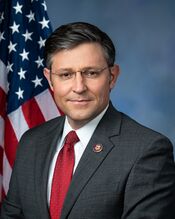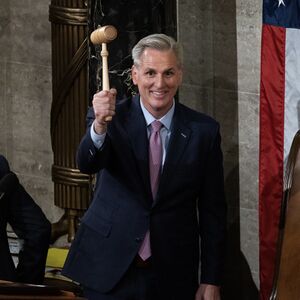الناطق بإسم مجلس النواب الأمريكي
| رئيس مجلس النواب الأمريكي | |
|---|---|
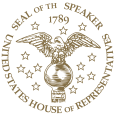 ختم الرئيس | |
 علم الرئيس | |
| مجلس النواب الأمريكي | |
| الأسلوب | السيد الرئيس (غير رسمي وداخل المجلس) المبجل (رسمي) |
| الوضع | الموظف الرئيسي |
| المقعد | كاپيتول الولايات المتحدة، واشنطن دي سي |
| المرشـِّح | الحزبان الرئيسيان (عادة) |
| المعيـِّن | المجلس يؤدي اليمين أمام Dean |
| طول المدة | حسب مدة المجلس يُ،تخب عند بدء كل جلسة للكونگرس، وحتى ينتهي الانعقاد |
| المجلس التمثيلي | دستور الولايات المتحدة |
| التشكل | 4 مارس 1789 |
| أول شاغل | فردريك مولنبرگ 1 أبريل 1789 |
| اللاحق | الثاني[1] |
| النائب | Speaker pro tempore |
| الراتب | 223.500 دولار سنوياً[2] |
| الموقع الإلكتروني | www |
| هذا المقال هو جزء من سلسلة عن: |
| مجلس النواب الأمريكي |
|---|
|
تاريخ مجلس النواب الأمريكي |
| الأعضاء |
|
|
| دوائر الكونگرس |
| السياسة والإجراءات |
| أماكن |
رئيس مجلس النواب الأمريكي Speaker of the House، هو الموظف الذي يترأس مجلس النواب الأمريكي. تأسس المنصب عام 1789 بموجب المادة الأولى، الفقرة الثانية، من الدستور الأمريكي. رئيس المجلس هو زعيم سياسي وبرلماني لمجلس النواب، ويكون رئيس مجلس النواب هو الزعيم الفعلي لحزب الأغلبية بالمجلس، ورئيس اداري مؤسسي للمجلس. كما يؤدي رؤساء المجلس مهام ادارية وإجرائية أخرى مختلفة.
لا يلزم الدستور أن يكون رئيس المجلس عضواً منتخباً في مجلس النواب، على الرغم من معظم رؤساء المجلس كانوا كذلك.[3] رئيس المجلس هو الثاني في خط الخلافة الرئاسي في الولايات المتحدة، بعد نائب الرئيس والرئيس المؤقت لمجلس الشيوخ الأمريكي.[4]
الرئيس الحالي لمجلس النواب هو الجمهوري مايك جونسون من لويزيانا. أًنتخب للمنصب في 25 أكتوبر 2023، وهو الرئيس رقم 56 للمجلس.[5]
. . . . . . . . . . . . . . . . . . . . . . . . . . . . . . . . . . . . . . . . . . . . . . . . . . . . . . . . . . . . . . . . . . . . . . . . . . . . . . . . . . . . . . . . . . . . . . . . . . . . . . . . . . . . . . . . . . . . . . . . . . . . . . . . . . . . . . . . . . . . . . . . . . . . . . . . . . . . . . . . . . . . . . . .
اختياره
يُنتخب رئيس مجلس النواب في اليوم الأول من انعقاد كل كونگرس جديد وفي حالة وفاة، استقالة أو إقالة رئيس المجلس الشاغر.[6] يطلب كاتب مجلس النواب مرشحين: ويكون هناك عادة اثنين من المرشحين، واحد من كل حزب رئيسي (يقرر كل حزب مرشحه في اجتماع مسبق). بعدها يدعو الكاتب النواب للاجتماع، ويختار كل نائب اسم المرشح الذي يدعمه. النواب غير مقيدين بالتصويت لواحداً من المرشحين وقد يصوتون لأي شخص، حتى لو لم يكن عضواً في مجلس النواب. ويمكنهم أيضاً الامتناع عن التصويت.[7]
على الرغم من عدم وجود قاعدة، فإنه تبعاً للتقاليد والممارسة المتبعة منذ الأيام المبكرة لتأسيس البلاد، يحصل رئيس المجلس المنتخب على أغلبية مطلقة من جميع الأصوات، عدا الممتنعين عن التصويت. في حال لم يفز المرشح بالأغلبية، تُعقد جلسة تصويت أخرى حتى يتم اختيار الرئيس.[7]
Speaker pro tempore
Under the Rules of the House, the speaker may designate a member to serve as speaker pro tempore, acting as the body's presiding officer in the speaker's absence. In most instances, the speaker pro tempore designation lasts for no more than three legislative days, although in the case of illness of the speaker, the speaker pro tempore may serve for ten legislative days if the appointment is approved by the House.[8]
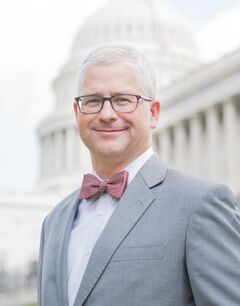
Separately, a speaker pro tempore is designated in the event the office of the speaker is declared vacant. Under the current Rules of the House, at the start of their term, the speaker is required to create a secret ordered list of members to temporarily serve as speaker of the House if the speakership became vacant[9] and to provide the Clerk of the United States House of Representatives this list "as soon as practicable after" the election "and whenever appropriate thereafter."[8][10] The names are only revealed in the event of a vacancy (e.g., by the speaker's death, resignation, incapacitation, or removal from office).[9][11] This "succession list" procedure was created in 2003,[12] following the September 11, 2001 attacks, to promote continuity of government.[11] Rule I, clause 8 of the House Rules states the member whose name appears first on the list "shall act as Speaker pro tempore until the election of a Speaker or a Speaker pro tempore."[12] The speaker pro tempore is not in the line of succession for the presidency.[11]
Following the removal of Kevin McCarthy as speaker in October 2023 on a motion to vacate (the first time in history that a speaker of the U.S. House of Representatives was successfully removed by the House), Patrick McHenry was revealed to be the first name on McCarthy's list and became acting speaker.[12][11] The intent of the rule was for the speaker pro tempore to serve for a short period, until the House elected a new speaker, but the House rules set no specific limit on the length of time that a member may be speaker pro tempore.[12]
The designation of a speaker pro tempore for purposes of succession, and for purposes of serving as the body's presiding officer in the speaker's absence, is separate from the speaker's designation of multiple members as speakers pro tempore for the purpose of allowing them to sign enrolled bills and joint resolutions.[11][13] The House Rules state: "With the approval of the House, the Speaker may appoint a Member to act as Speaker pro tempore only to sign enrolled bills and joint resolutions for a specified period of time."[8] The list of the members with this duty (usually political allies of the speaker, or members from districts close to Washington and thus better able to hold pro forma sessions) is made public.[11]
التاريخ
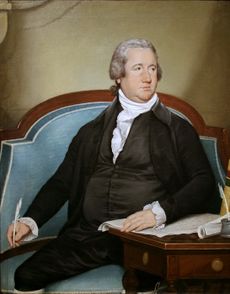

The first speaker of the House, Frederick Muhlenberg of Pennsylvania, was elected to office on April 1, 1789, the day the House organized itself at the start of the 1st Congress. He served two non-consecutive terms in the speaker's chair, 1789–1791 (1st Congress) and 1793–1795 (3rd Congress).[14]
As the Constitution does not state the duties of the speaker, the speaker's role has largely been shaped by rules and customs that evolved over time. Scholars are divided as to whether early speakers played largely ceremonial and impartial roles or whether they were more active partisan actors.[15]
القرن 19
From early in its existence, the speaker's primary function had been to keep order and enforce rules. The speakership was transformed into a position with power over the legislative process under Henry Clay (1811–1814, 1815–1820, and 1823–1825).[16][17] In contrast to many of his predecessors, Clay participated in several debates and used his influence to procure the passage of measures he supported—for instance, the declaration of the War of 1812, and various laws relating to Clay's "American System" economic plan. Furthermore, when no candidate received an Electoral College majority in the 1824 presidential election, causing the president to be elected by the House, Speaker Clay threw his support to John Quincy Adams instead of Andrew Jackson, thereby ensuring Adams' victory. Following Clay's retirement in 1825, the power of the speakership once again began to decline, despite speakership elections becoming increasingly bitter. As the Civil War approached, several sectional factions nominated their own candidates, often making it difficult for any candidate to attain a majority. In 1855 and again in 1859, for example, the contest for speaker lasted for two months before the House achieved a result. Speakers tended to have very short tenures during this period. For example, from 1839 to 1863 there were eleven speakers, only one of whom served for more than one term. James K. Polk is the only speaker of the House who was later elected president of the United States.
القرن العشرون
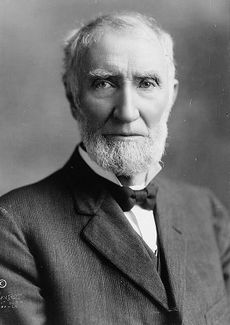
القرن 21
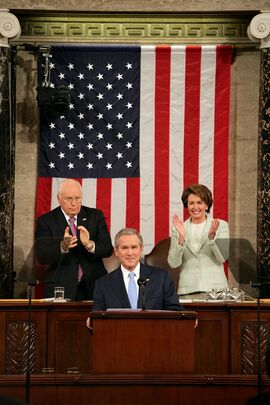
The Republicans came out of the 2000 elections with a further reduced majority but made small gains in 2002 and 2004. The periods of 2001–2002 and 2003–2007 were the first times since 1953–1955 that there was single-party Republican leadership in Washington, interrupted from 2001 to 2003 as Senator Jim Jeffords of Vermont left the Republican Party to become independent and caucused with Senate Democrats to give them a 51–49 majority.
In the 2006 midterm elections, the Democratic Party regained control of the House of Representatives. Nancy Pelosi was elected Speaker of the House, becoming the first woman to hold the position.
President Bush acknowledged Pelosi as the first woman in that position in the opening of his speech.[18]
John Boehner was elected speaker when the 112th Congress convened on January 5, 2011, and was subsequently re-elected twice, at the start of the 113th and 114th Congresses. On both of those occasions his remaining in office was threatened by the defection of several members from his own party who chose not to vote for him.[19][20] Boehner's tenure as speaker, which ended when he resigned from Congress in October 2015, was marked by multiple battles with the conservatives in his own party related to "Obamacare", appropriations, among other political issues.[21] This intra-party discord continued under Boehner's successor, Paul Ryan.
When Republican leader John Boehner succeeded Pelosi as speaker in 2011, Pelosi remained the leader of the Democratic Party in the House of Representatives and served as House minority leader for eight years before she led her party to victory in the 2018 elections. Following the 2018 midterm elections which saw the election of a Democratic Party majority in the House, Nancy Pelosi was again elected speaker when the 116th Congress convened on January 3, 2019. In addition to being the first woman to hold the office, Pelosi became the first speaker to return to power since Sam Rayburn in the 1950s.[22] Following the 2022 midterm elections which saw the election of a narrow Republican Party majority in the House, Pelosi did not seek a Democratic leadership post in the next Congress. The Democratic Caucus named her "Speaker Emerita".[23][24]
Kevin McCarthy then became the new Speaker of the House on January 7, 2023, after the longest multi-ballot speaker election since 1859.[25][26] McCarthy was eventually removed as speaker on October 3, 2023, after a further split in the Republican caucus, with five House Freedom Caucus members voting against McCarthy, which when combined with lack of support by Democrats, resulted in the ouster of McCarthy.[27] This was the first time in the history of the House of Representatives in which the Speaker of the House was successfully removed.[28] Following a multi-day four-ballot election, Mike Johnson was elected speaker on October 25, 2023.[29][30][31]
. . . . . . . . . . . . . . . . . . . . . . . . . . . . . . . . . . . . . . . . . . . . . . . . . . . . . . . . . . . . . . . . . . . . . . . . . . . . . . . . . . . . . . . . . . . . . . . . . . . . . . . . . . . . . . . . . . . . . . . . . . . . . . . . . . . . . . . . . . . . . . . . . . . . . . . . . . . . . . . . . . . . . . . .
الانتخابات الشهيرة

| هذا المقال جزء من سلسلة عن |
| سياسة الولايات المتحدة |
|---|
 |
Multi-ballot elections
In total, there have been 16 elections requiring multiple ballots to elect a speaker, with 13 before the American Civil War, one in 1923, and two in 2023.[33]
. . . . . . . . . . . . . . . . . . . . . . . . . . . . . . . . . . . . . . . . . . . . . . . . . . . . . . . . . . . . . . . . . . . . . . . . . . . . . . . . . . . . . . . . . . . . . . . . . . . . . . . . . . . . . . . . . . . . . . . . . . . . . . . . . . . . . . . . . . . . . . . . . . . . . . . . . . . . . . . . . . . . . . . .
الدور الحزبي
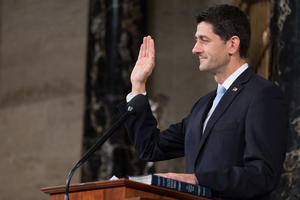
الموظف الرئيس
مهام أخرى
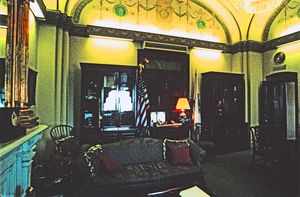
انظر أيضاً
المراجع
- Beth, Richard S.; Heitshusen, Valerie (January 4, 2013). "Speakers of the House: Elections, 1913–2013" (PDF). Congressional Research Service. Retrieved January 14, 2015.
- Garraty, John, ed. American National Biography (1999) 20 volumes; contains scholarly biographies of all Speakers no longer alive.
- Green, Matthew N. The Speaker of the House: A Study of Leadership (Yale University Press; 2010) 292 pages; Examines partisan pressures and other factors that shaped the leadership of the speaker of the U.S. House of Representatives; focuses on the period since 1940.
- Grossman, Mark. Speakers of the House of Representatives (Amenia, NY: Grey House Publishing, 2009). The comprehensive work on the subject, covering, in depth, the lives of the Speakers from Frederick Muhlenberg to Nancy Pelosi.
- Remini, Robert V. The House: the History of the House of Representatives (Smithsonian Books, 2006). The standard scholarly history.
- Rohde, David W. Parties and Leaders in the Postreform House (1991).
- Smock, Raymond W., and Susan W. Hammond, eds. Masters of the House: Congressional Leadership Over Two Centuries (1998). Short biographies of key leaders.
- Zelizer. Julian E. ed. The American Congress: The Building of Democracy (2004). A comprehensive history by 40 scholars.
الهوامش
المصادر
- ^ "3 U.S. Code § 19 - Vacancy in offices of both President and Vice President; officers eligible to act".
- ^ Brudnick, Ida A. (January 4, 2012). "Congressional Salaries and Allowances" (PDF). CRS Report for Congress. United States House of Representatives. Retrieved December 2, 2012.
- ^ "Office of the Clerk of the U.S. House of Representatives". Clerk.house.gov. Retrieved August 10, 2012.
- ^ See the United States Presidential Line of Succession statute, 3 U.S.C. § 19
- ^ Mychael Schnell; Emily Brooks (October 25, 2023). "House elects Mike Johnson as Speaker, ending GOP chaos". The Hill (in الإنجليزية). Retrieved October 25, 2023.
- ^ Beth, Richard S.; Heitshusen, Valerie (January 4, 2017). Speakers of the House: Elections, 1913-2017 (PDF). Washington, DC: Congressional Research Service. Retrieved 9 February 2018.
- ^ أ ب "We're sorry, that page can't be found" (PDF).
- ^ أ ب ت Rules of the House of Representatives 118th Congress, Rule I, Section 8.
- ^ أ ب Brent D. Griffiths, Once a secret, the temporary House speaker is Rep. Patrick McHenry, Insider (October 3, 2023).
- ^ House Practice, chap. 34 (Office of the Speaker): "Under rule I clause 8(b)(3), adopted in the 108th Congress, the Speaker is required to deliver to the Clerk a list of Members in the order in which each shall act as Speaker pro tempore in the case of a vacancy in the Office of Speaker."
- ^ أ ب ت ث ج ح Katherine Tully-McManus, McHenry named as acting speaker, Politico (October 3, 2023).
- ^ أ ب ت ث Kyle Stewart, What happens next after Kevin McCarthy ousted as speaker of the House, NBC News (October 3, 2023).
- ^ House Practice, chap. 34 (Office of the Speaker): "If the Speaker appoints a Speaker pro tempore only for purposes of signing enrolled bills and joint resolutions, such an appointment may extend for a 'specified period of time' with the approval of the House. Rule I clause 8. The Speaker may appoint two alternate Members to sign enrolled bills. Manual Sec. 634."
- ^ "List of Speakers of the House". history.house.gov. United States House of Representatives. Archived from the original on January 14, 2021. Retrieved January 11, 2019.
- ^ Peart, Daniel (2021). "Rethinking the Role of the Speaker: Power, Institutional Development, and the Myth of the "Impartial Moderator" in the Early US House of Representatives". Journal of Policy History (in الإنجليزية). 33 (1): 1–31. doi:10.1017/S0898030620000226. ISSN 0898-0306. S2CID 231694119. Archived from the original on February 2, 2021. Retrieved March 11, 2021.
- ^ C. Stewart III, "Architect or tactician? Henry Clay and the institutional development of the US House of Representatives" 1998, online Archived يناير 14, 2021 at the Wayback Machine
- ^ "Henry Clay (1825–1829)". U.S. Presidents. Charlottesville, Virginia: Miller Center of Public Affairs, University of Virginia. October 4, 2016. Archived from the original on May 10, 2021. Retrieved May 10, 2021.
- ^ Bush, George W. (January 23, 2007). "President Bush Delivers State of the Union Address". The White House. Archived from the original on May 2, 2013. Retrieved August 26, 2007.
- ^ Cohen, Micah (January 4, 2013). "Were the G.O.P. Votes Against Boehner a Historic Rejection?". The New York Times. Archived from the original on January 14, 2021. Retrieved March 1, 2019.
- ^ Walsh, Deirdre (January 6, 2015). "Boehner Overcomes Big Opposition to Remain Speaker". CNN. Archived from the original on January 29, 2015. Retrieved March 1, 2019.
- ^ Shesgreen, Deirdre; Allen, Cooper (September 25, 2015). "Speaker John Boehner to resign from Congress". USA Today. Archived from the original on January 14, 2021. Retrieved February 4, 2019.
- ^ Wire, Sarah D. (January 3, 2019). "Nancy Pelosi regains the House speaker's gavel as Democrats confront Trump over partial shutdown". The Denver Post. Archived from the original on January 14, 2021. Retrieved September 28, 2019.
- ^ Diaz, Daniella (December 2, 2022). "House Democrats pick Hakeem Jeffries to succeed Nancy Pelosi, the first Black lawmaker to lead a party in Congress". CNN. Retrieved January 7, 2023.
- ^ Schnell, Mychael (December 1, 2022). "House panel votes to designate Pelosi 'Speaker Emerita'". The Hill. Retrieved January 7, 2023.
- ^ McCartney, Allison; Parlapiano, Alicia; Wu, Ashley; Zhang, Christine; Williams, Josh; Cochrane, Emily; Murphy, John-Michael (January 4, 2023). "Vote Count: McCarthy Elected House Speaker After 15 Ballots". The New York Times (in الإنجليزية الأمريكية). ISSN 0362-4331. Retrieved October 20, 2023.
- ^ "Kevin McCarthy elected US House Speaker after 15 rounds of voting". BBC News (in الإنجليزية البريطانية). January 6, 2023. Retrieved October 20, 2023.
- ^ "House passes 45-day funding bill, likely avoiding a government shutdown". NBC News (in الإنجليزية). September 30, 2023. Retrieved October 3, 2023.
- ^ Hutzler, Alexandra; Peller, Lauren; Scott, Rachel; Siegel, Benjamin; Parkinson, John. "McCarthy vote live updates: House speaker ousted for first time in US history". ABC News (in الإنجليزية). Retrieved October 3, 2023.
- ^ Greve, Joan E (October 25, 2023). "Republican Mike Johnson elected House speaker after weeks of chaos". The Guardian. Retrieved October 26, 2023.
- ^ Zurcher, Anthony (October 25, 2023). "Mike Johnson: Republicans got a Speaker elected. Now begins the hard part". BBC News. Retrieved October 26, 2023.
- ^ "Republican Mike Johnson elected US House speaker". Al Jazeera. October 25, 2023. Retrieved October 26, 2023.
- ^ Bush, George W. (January 23, 2007). "President Bush Delivers State of the Union Address". The White House. Archived from the original on May 2, 2013. Retrieved August 26, 2007.
{{cite web}}: Unknown parameter|deadurl=ignored (|url-status=suggested) (help) - ^ "Speaker Elections Decided by Multiple Ballots". United States House of Representatives. Retrieved October 26, 2023.
وصلات خارجية
- "Speaker of the House of Representatives". Retrieved 30 October 2016. Official Website, Information about role as party leader, powers as presiding officer.
- "Capitol Questions." C-SPAN (2003). Notable elections and role.
- The Cannon Centenary Conference: The Changing Nature of the Speakership. (2003). House Document 108-204. History, nature and role of the Speakership.
- Congressional Quarterly's Guide to Congress, 5th ed. (2000). Washington, D.C.: Congressional Quarterly Press.
- Wilson, Woodrow. (1885). Congressional Government. New York: Houghton Mifflin.
| ترتيب الأولوية | ||
|---|---|---|
| سبقه نائب رئيس الولايات المتحدة |
الثاني في خط الرئاسة | تبعه الرئيس المؤقت لمجلس الشيوخ الأمريكي أورين هاتش |
